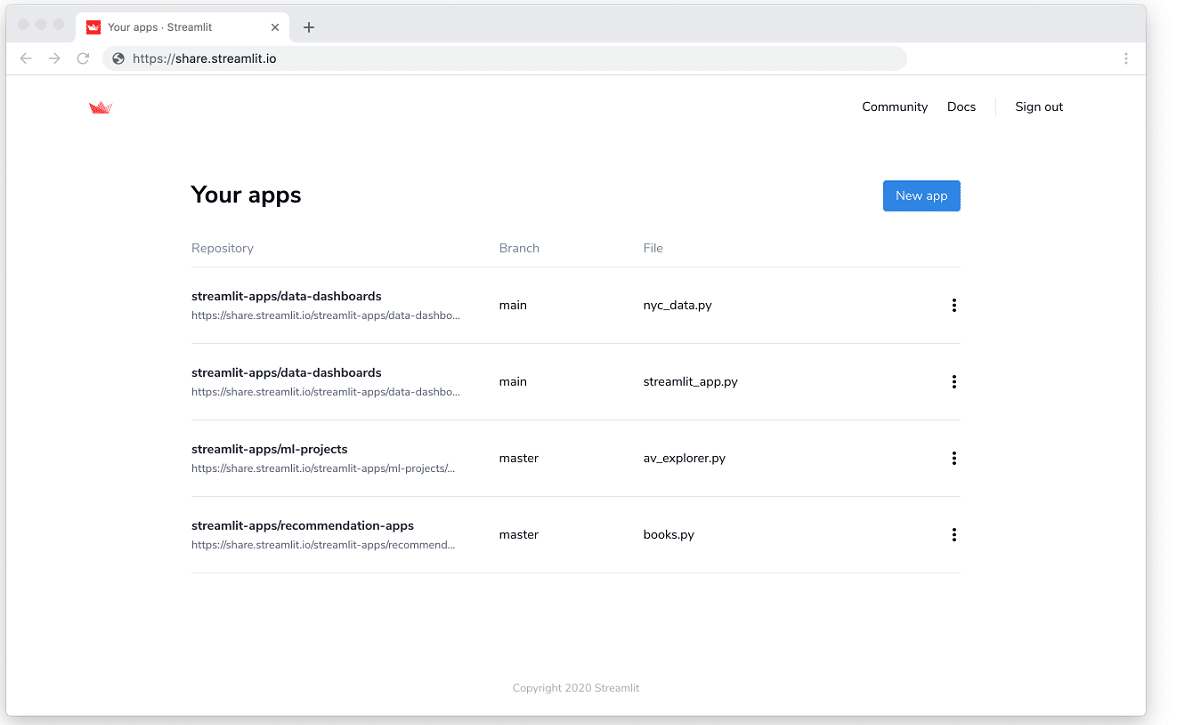
Streamlit Inc., an artificial intelligence startup backed by Gradient Ventures of Google LLC, made it known recently a new service called "Streamlit Sharing" which is designed to make it easy for developers to share their machine learning applications with users.
On the whole, Streamlit and GitHub enable an incredibly rich and diverse ecosystem of useful applications, from dashboards to deep networks and more.
And is that building a machine learning application requires more than just training a neural network. There is also a need for a user interface to present the results of neural network processing and a data ingestion pipeline that provides the software with the information it needs to process.
streamlit, based in San Francisco, offers a popular open source tool of the same name which promises to reduce homework from weeks to hours.
Despite being released just a year ago, Streamlit already boasts over a million downloads and multiple Fortune 500 users.
The startup claims that developers have used your tool to create hundreds of thousands of machine learning applications to date.
Streamlit Sharing, the new cloud service launched recently, is essentially a free hosting platform where developers can run their Streamlit-built machine learning software.
End users can access the applications hosted on the service through a browser.
The problem is that Streamlit Sharing is only open to open source applications whose code is publicly available on GitHub, But Streamlit is also creating a paid offer for commercial projects that is currently in private beta.
Streamlit sharing combines the best of Streamlit with the best of GitHub. From Streamlit, you get a simple framework for creating incredibly rich and useful applications. From GitHub you inherit an incredible framework for social collaboration. Paste your GitHub link into Streamlit's sharing platform and you almost instantly have a live app. Or click the menu of any live application and view its source code on GitHub. Collaborate for free by simply forking and editing the code. It's collaborative, global, shareable and fork-friendly data science!
Streamlit Sharing aims to strengthen the open source ecosystem around the startup tool.
GitHub already offers a platform where developers can share machine learning projects, Streamlit CEO Adrien Treuille noted in a blog post, but there is a technical barrier for end users.
Running a Streamlit application from GitHub requires downloading the raw code, running it, and reading the documentation. Applications hosted on Streamlit Sharing, on the other hand, can be opened in a browser like any web service.
"Github is packed with amazing ideas, models, algorithms, and data sets," Treuille wrote. “But it's just code, and the code alone doesn't allow you to play with models, see algorithms, or touch data. It is very difficult. You have to install something, import dependencies, and read code samples before seeing it in action. What you want is a 'play' button «.
Streamlit Sharing allows developers to load their applications pasting the link to the GitHub repository that contains your code. By simplifying the sharing of AI projects, the service reduces another adoption barrier for the startup's tool, which should ultimately drive its user acquisition strategy.
Having a large installed base of open source users will provide useful market validation when Streamlit finally launches its paid offering.
Streamlit Sharing's launch comes about four months after the startup closed a $ 21 million funding round co-led by Google LLC's Gradient Ventures fund and GGV Capital.
Finally, if you want to know more about the note, you can consult the following link
In the same way you can follow the following tutorial to know how to implement a Streamlit application. The link is this.